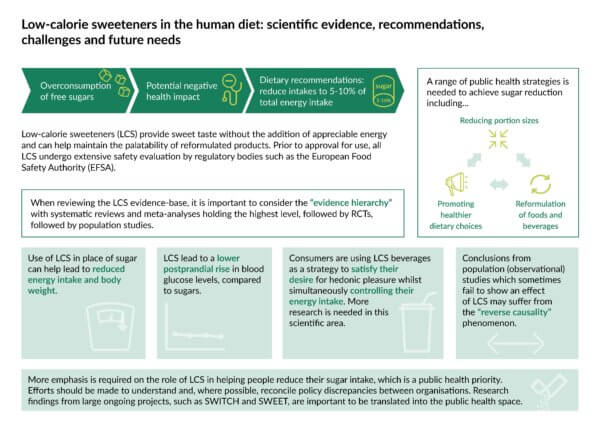Key remarks of a published symposium report from FENS 2019 conference
Highlights:
- To achieve the recommended sugar reduction, the implementation of a range of public health strategies is needed, including reducing portion sizes, promoting healthier dietary choices and reformulating foods and beverages.
- Low/no calorie sweeteners can help in product reformulation as they allow to replace sugar and reduce calories in foods and beverages while maintaining sweet taste.
- Prior to approval for use, all low/no calorie sweeteners undergo extensive safety evaluation by regulatory bodies worldwide who have confirmed they are safe.
- Despite regulatory approval and their useful role in sugar reduction, several claims persist about adverse effects, many of which are based on poor, little or no scientific evidence.
- Countering misinformation, where existent, is needed to ensure a balanced reporting of the totality of the research evidence base.
The current article discusses the key outcomes of a recently published symposium report by Gallagher et al1 which summarised key messages from presentations and discussions delivered at an ISA-organised scientific symposium at the 13th European Nutrition Conference (FENS 2019). With sugar reduction being a public health priority, the symposium aimed to address the scientific evidence and recommendations for the use and potential benefits of low/no calorie sweeteners in sugar reduction, with a particular focus on effects on body weight and glycaemic control, as well as to discuss future research.
Looking at the available evidence from human clinical studies as reviewed in systematic reviews and analysed in recent meta-analyses, the authors concluded that low/no calorie sweeteners can help in energy reduction and thus in weight management, as long as they are used to replace sugar and sugar-sweetened products in the diet.
With regard to their impact on diabetes and glucose control, low/no calorie sweeteners cause a lower spike in blood glucose, when compared to sugar. This is important for people with diabetes who need to manage their blood glucose levels and avoid glucose spikes. When studies compare low/no calorie sweeteners to water or placebo, their impact on glucose control or on body weight is similar, meaning that they should not be expected to have some type of pharmacological or weight-loss effect.
Understanding and communicating the potential benefits of low/no calorie sweetener use
Understanding which are the potential benefits of low/no calorie sweeteners is important for better risk–benefit communication. Low/no calorie sweeteners allow the formulation of sweet-tasting products with fewer or zero sugar and less or no calories. So, when people consume foods or drinks with low/no calorie sweeteners in place of their sugary versions, they consume less calories during the day and, ultimately, this can lead to a modest weight loss over a period of time. This shouldn’t be expected to happen if there is no sugar replacement, and thus no calorie reduction, in the diet.
Also, people consuming products with sugar substitutes frequently choose these products because low/no calorie sweetened foods and drinks help them maintain a good-tasting diet while also satisfying the longer-term goal of weight control. Practically, this means that low/no calorie sweeteners help some people adhere to a more palatable calorie-reduced dietary plan. In fact, in some cases research has shown that low/no calorie sweeteners can help some individuals manage food cravings and feel more in control and less guilty about eating.
The nutrition academics and researchers authoring this symposium report concluded that, given the public health interest on the impact of sugars on health and the potential role that low/no calorie sweeteners could play, it is important that the totality of evidence as well as research findings from ongoing big projects are fully translated into the public health space. However, the authors also highlighted the importance to recognise that even with a well-developed evidence base, translation of any benefit of low/no calorie sweeteners into wider public health benefits will ultimately be hampered if unsubstantiated scepticism surrounding sugar substitute use persists among the general public, health professionals and other key stakeholders. Therefore, it is crucial to counter misinformation, which exists in this area despite consistent regulatory approval and confirmation of safety of low/no calorie sweeteners.
A better risk–benefit communication is needed in order to ensure a balanced reporting of the totality of the evidence base and, importantly, to support wider public health strategies aimed at reducing excessive sugars intake and thereby result in positive impacts on human health.
 Graphical abstract of the paper by Gallagher et al. Available online here.
Graphical abstract of the paper by Gallagher et al. Available online here.

